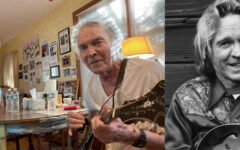
Canada’s Lonesome Ace Stringband comes about their purist pedigree quite naturally. Its three core members — Chris Coole (banjo), John Showman (fiddle) and Max Heineman (bass) — pride themselves on being journeyman musicians and veterans of some of Canada’s top roots music ensembles, among them, the New Country Rehab, The David Francey Band, Fiver, and The Foggy Hogtown Boys. A self-described “old-time band with bluegrass chops that play some righteous folk and country music,” they boast astute instrumental interplay and a keen knack for nuance. Their seemingly natural rapport more than makes up for their relatively scant instrumental line-up, while holding true to absolute authenticity. Indeed, their sound takes its cue from the vintage sounds originally birthed in the American South. All three musicians share lead vocals while also indulging in some exacting harmonies, an additive that’s essential to the music’s honesty and sensibilities.
“My very first few bluegrass albums were Native Home by the Nashville Bluegrass Band, and the original album by Old and In the Way,” Coole notes. “Within a few years, it was all about the Stanley Brothers and Bill Monroe.”
The band’s origins go back over a decade, to 2007 to be exact, when they took up a residency at Toronto’s Dakota Tavern. There they would generally perform no less than ten sets of music every weekend. They retained their role as the venue’s house band for seven years, prior to entering the studio and taking to the road. Touring allowed them to hone their chops and develop the close bond that’s been a hallmark of their approach ever since.
“So far we have played in Canada, the U.SA., England, Ireland, Scotland, Denmark, Germany, Switzerland, Austria, and the Netherlands,” Coole claims. “The great thing about this music is you get to meet your heroes.” It’s no wonder; the band has performed at some of Europe and North America’s most prestigious festivals, including Merlefest, Rockygrass, Wintergrass, the Winnipeg Folk Festival, the Vancouver Folk Festival, and the John Hartford Memorial festival. They’ve also recorded four albums — Old Time (2014), Gone For Evermore (2016), When the Sun Comes Up (2018), and their latest, Modern Old-Time Sounds for the Bluegrass and Folksong Jamboree (2019). Each effort reflects the band’s combination of songwriting and studio savvy, as well as their unique perspective on a timeless indigenous genre.
“We have a great fan base in Canada,” Coole adds, noting the acceptance they’re received at home.“There’s an amazing scene in Toronto where we’re based, and we’re so happy to be a part of that.”
That said, he acknowledges the fact that bluegrass now claims its own international appeal. “It’s got so many folk music elements,,” he notes. “The roots of folk music are universal… kind of the ‘old tones’ thing that Bill Monroe once talked about.”







